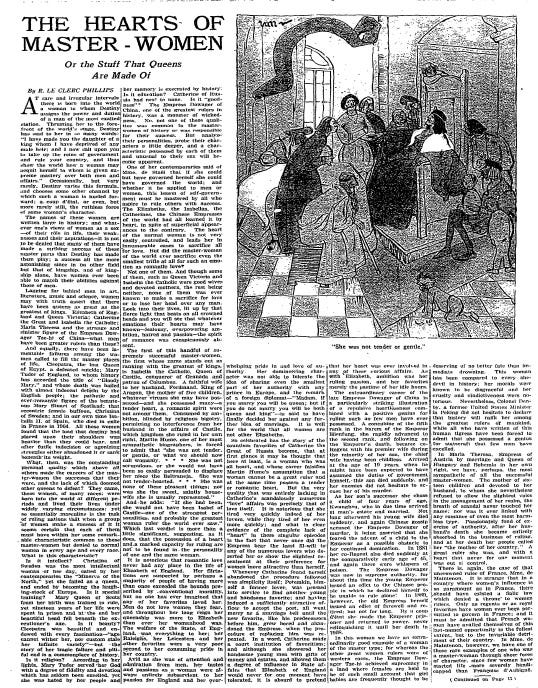The Hearts of Master-Women
What was the common trait among history's greatest women?
In a 1923 New York Times Magazine article, female journalist R. LeClerc Phillips ruled out qualities one by one like intellect, religion, and education. Ultimately, she determined, they'd all spurned romantic love.
The heart of the normal woman is not very easily controlled, and leads her in innumerable cases to sacrifice all for love. But did the master-women of the world ever sacrifice even the smallest trifle at all for such an emotion as romantic love?
1923: when a publication like the Times could publish the sentence "The heart of the normal woman is not very easily controlled."
Phillips went on to answer her own question in the negative:
Not one of them. And though some of them, such as Queen Victoria and Isabella the Catholic were good wives and devoted mothers, the rest [including Queen Elizabeth I of England, Catherine the Great of Russia, and Empress Dowager Tze-hi of China] being neither, none of them was ever known to make a sacrifice for love or to lose her head over any man.
Those examples of history's greatest women at the time were all royalty, inheriting their titles through heredity. The first woman ever elected to lead a nation would arrive in 1980, when Vigdís Finnbogadóttir was elected president of Iceland.
Look into their lives, lit up by that fierce light that beats on all crowned heads and you will see that whatever emotions their hearts may have known — jealousy, overpowering ambition, hatred, and passion — the spirit of romance was conspicuously absent.
That got me wondering whether a gender-swapped version of Aaron Sorkin's 1995 romantic comedy The American President would work. In that film, a widowed Democratic Party president played by Michael Douglas finds new love while in the White House, with an environmental lobbyist played by Annette Bening. What about a woman president falling in love with a male lobbyist?
Surely some, particularly on the left, would criticize such a premise for stereotyping. But if the protagonist commander-in-chief was still portrayed as a strong powerful leader, perhaps with some sort of subplot involving the military, I think the tightrope could be walked successfully. Especially if the right trio of screenwriter, director, and lead actress were attached to the project. Hiring women for at least two of those three positions, or even all three, could help quiet much of the would-be controversy.
The Hearts of Master-Women
Published: Sunday, November 4, 1923


